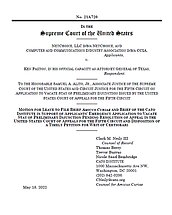NetChoice and CCIA, two trade associations of online businesses, immediately sued Texas in a federal district court, arguing the law violated platforms’ well-established First Amendment right to choose what content they host. The district court agreed and issued a thirty-page opinion stopping the law from going into effect, which is called a preliminary injunction. Texas appealed the district court’s decision to the Fifth Circuit (where Cato also filed a brief). That court has not yet released its opinion, but on Wednesday night it abruptly issued a one-sentence order lifting the district court’s preliminary injunction. The law is now in effect. As a result, social media companies suddenly can’t moderate content on their own websites, an essential element of their business models.
NetChoice and CCIA filed an emergency application to the Supreme Court to reinstate the injunction pending the Fifth Circuit’s decision. Cato has filed an amicus brief supporting NetChoice’s application. In the brief, we explain that under the law’s viewpoint-neutrality requirement, platforms may suddenly face liability for removing any lawful content, however horrific. This includes footage of animal torture, pro-terrorism material, and racial epithets—all speech protected by the First Amendment—because removing these posts would qualify as viewpoint discrimination.
Most users do not want to see animal abuse, ISIS recruitment material, or racial slurs when they go on Facebook, nor do Facebook and other social media platforms want to host such material. If platforms are required to show their users unpalatable content, many users will be deprived of the websites’ beneficial use entirely.
The prospect of the world’s most popular social media platforms becoming overrun with offensive content under the viewpoint neutrality mandate is not merely speculative. Case studies from unmoderated or lightly moderated platforms—including recent attempts to create “free speech” alternatives to Facebook and Twitter—show that proliferation of vile material reliably occurs under a “viewpoint neutrality” moderation rule. This, in turn, always leads to an exodus of users for whom exposure to such content precludes enjoyable use.
The Supreme Court first established that the First Amendment protects private entities’ right to choose what content they host nearly 50 years ago in Miami Herald v. Tornillo. And before the Fifth Circuit’s order, lower courts had consistently applied this right to content moderation on social media platforms. By eviscerating social media platforms’ well-established right without explanation, the Fifth Circuit denied social media platforms the meaningful, careful review they are entitled to. To avert the substantial harms the Texas law will cause to platforms and to the public interest alike, the Supreme Court should vacate the Fifth Circuit’s order and allow the district court’s preliminary injunction to remain in place.





